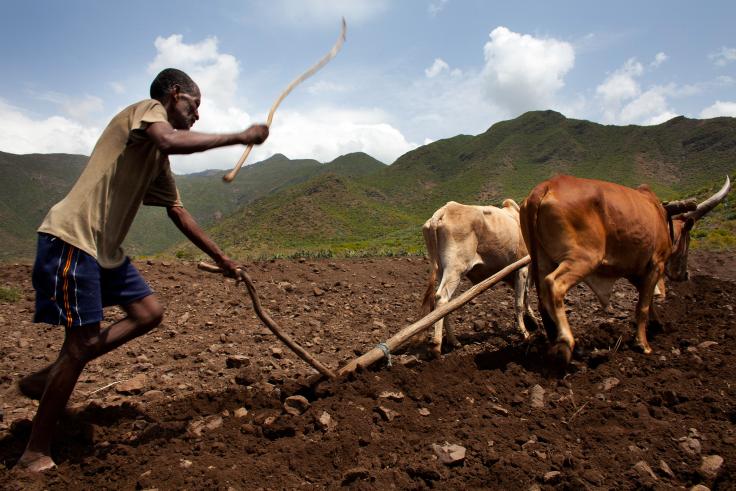 Ethio-Pandemic Multi-Sectoral Prevention, Preparedness, and Response
Ethio-Pandemic Multi-Sectoral Prevention, Preparedness, and Response
Background
Confronted with prolonged conflict and a multi-year drought, the Government of Ethiopia faces unique challenges in addressing vulnerabilities to emerging pathogens and critical gaps in pandemic prevention, preparedness, and response (PPR). Ethiopia is one of Africa’s most populous countries with a high population growth rate and over 80 percent of the population residing in rural areas. Since the height of the COVID-19 pandemic, the country has endured numerous disease outbreaks including zoonotic pathogens (anthrax, rabies, brucellosis, bovine tuberculosis) and emerging zoonotic diseases (Rift Valley fever, avian influenza). Conflict and drought have resulted in an estimated 22 million people in need of humanitarian assistance and 5.3 million internally displaced persons (WHO 2023).
The Ethio-Pandemic Multi-Sectoral Prevention, Preparedness, and Response Project (EPPR) is a partnership between the Government of Ethiopia’s Ministries of Health, Agriculture, and Finance and three Implementing Entities (IEs) (FAO, UNICEF, and WHO). It is supported by a $50 million grant from the Pandemic Fund and an additional $61.4 million in co-financing. The Project will invest in Ethiopia’s pandemic PPR efforts. EPPR brings together other key stakeholders, including civil society organizations, the International Organization for Migration, Resolve to Save Lives, the Clinton Health Access Initiative, Ohio State University, Addis Ababa University, and Hawassa University.
The EPPR is a comprehensive plan that addresses key areas of pandemic PPR that are specific to Ethiopia’s complex landscape.
Project objectives
The EPPR Project aims to strengthen surveillance systems, enhance the national laboratory system, and ensure the availability of skilled and competent One Health professionals for a sustainable and functional public health system to enable prevention, detection, and response to pandemics.
Implementation arrangements and key components
A Joint Coordination Committee (JCC), made up of representatives from government entities and partner organizations, will be established at the start of the Project and will regularly review progress, discuss challenges, and provide guidance to the overall strategic direction of the project. A joint Monitoring and Evaluation framework will be developed and validated by the JCC to track project progress, assess the effectiveness of interventions, and identify areas of improvement. This will involve data sharing and conducting joint field visits, workshops, and evaluations.
The key components and project activities are aligned with the national plans including Ethiopia's Health Sector Transformation Plan, Ethiopia Public Health Institute's Strategic Plan, the Ethiopian National Health Emergency Preparedness and Response Plan, and the Ethiopian Antimicrobial Resistance (AMR) National Action Plan. The Project also addresses findings from the Joint External Evaluation (JEE) and State Party Self-Assessment Annual Reporting (SPAR) assessments.
EPPR will finance activities in four broad areas. Implementing Entity support is indicated under each component.
- Strengthening surveillance and early warning detection. Activities in this component include establishing an intersectoral, interoperable and integrated electronic reporting alert system; carrying out International Health Regulations (IHR) capacity assessments (including simulation exercises, SPAR, and JEE) and joint-multisectoral risk assessments for chemical, biological, radiological, and nuclear (CBRN) agents; reinforcing surveillance and early warning systems in humanitarian settings (e.g. refugee sites); investing in the capacity of five point of entries; and adopting mobile technology and population mobility mapping tools (FAO, WHO).
- Building laboratory capacity. This component includes developing One Health guidelines to strengthen laboratory systems; procuring critical equipment and supplies for laboratory expansion, biosafety and biosecurity, AMR, pathogen genomics, and other laboratory diagnostics; as well as support the mapping of 2500 labs and 218 veterinary labs (referral capacity) for strategic sample collection, transport, and storage of pathogens (FAO, WHO).
- Strengthening the workforce. Activities include training and capacity building for various levels and sectors of the workforce, including surge capacity; emergency supply chain management; database management; emergency and critical care management; community-based surveillance; zoonotic disease prevention; food safety; CBRN surveillance and response; and environmental health, among others (FAO, UNICEF, WHO).
- Communication and education. Activities will strengthen risk communication to the public, policymakers, and healthcare providers by ensuring they have accurate, timely, and actionable information during outbreak-related health emergencies. This will drive behavioral change, risk mitigation, and the adoption of preventive measures within communities and will combat misinformation from social media and other sources. Empowering communities to take preventive measures and participate in outbreak containment activities will ultimately help mitigate the impact of pandemics when they emerge (all).
In terms of mitigating potential governance, operational, and financial risks from ongoing conflict in certain regions of the country, EPPR will include routine security assessments conducted by the Implementing Entities and delivery partners to prepare/update contingency implementation plans. As for the risk posed by the ongoing drought crisis, EPPR will continue to advocate and engage with leadership and technical focal points within sectors to update plans as necessary.
Expected outcomes
With the $50 million Pandemic Fund grant and $63 million in co-financing, EPPR is expected to make valuable contributions to Ethiopia’s efforts in pandemic PPR. For Ethiopia’s workforce, it will strengthen existing training, management, and response teams across human and animal sectors at all levels (Target: 6,870 professionals). Ethiopia’s laboratory systems will increase services and accessibility including improved detection of priority pathogens (Target: 2500 facilities mapped, 120 professionals trained, 15 AMR sentinel sites, 5 AMR surveillance sites, and 5 molecular labs established). Lastly, Ethiopia will enhance surveillance of outbreaks at points of entries and improve the alert system mechanism for the country (Target: 45 hospitals with infection surveillance, 30 functional Public Health Emergency Operations Centers, 12 risk assessments conducted, surveillance systems in 10 humanitarian settings and 5 additional points of entries).
For general inquiries: the_pandemic_fund@worldbank.org
-
 RegionProject RegionsAfrica
RegionProject RegionsAfrica -
 CountryProject CountriesEthiopia
CountryProject CountriesEthiopia -
 Amount Approved (US$) $50,000,000
Amount Approved (US$) $50,000,000 -
 Total Co-financing
Total Co-financing
(in kind & in cash) (US$) $61,400,000 -
 Total Co-investment
Total Co-investment
(in kind & in cash) (US$) $1,600,000
Related Links
- FAO Ethiopia Project Page
-
FAO champions implementation of 12 projects as The Pandemic Fund rolls out first round of financing
FAO | August 10, 2023 -
Ethiopia launches the Pandemic Fund mega project against potential pandemics
WHO | February 7, 2024 -
Ethiopia bolsters public health emergency response through workforce development with support from the Pandemic Fund
WHO | March 20, 2025 -
Protecting the future: annual review meeting of Ethiopia’s EPPR project
WHO | August 14, 2025

